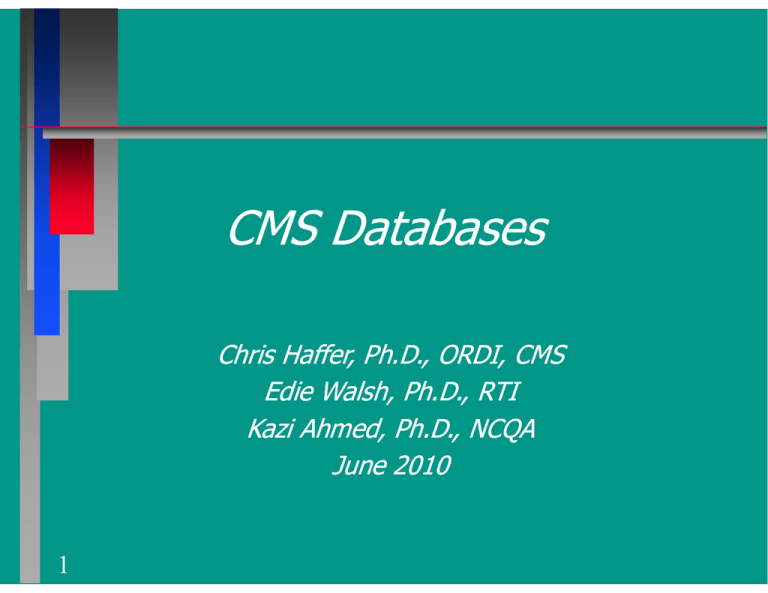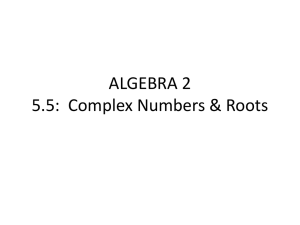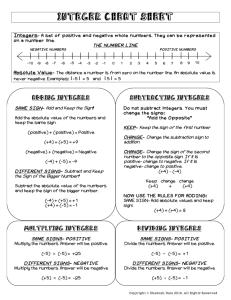CMS Databases
advertisement

CMS Databases Chris Haffer,, Ph.D.,, ORDI,, CMS Edie Walsh, Ph.D., RTI Kazi Ahmed,, Ph.D.,, NCQA Q June 2010 1 Session S i G Goals: l Review the different types of data that are available Focus on the utility y of using g these data sets to answer timely and significant questions in health services research 2 Sources of Medicare Data Medicare Beneficiary Database (Enrollment & Entitlement) FFS • Part A [Inpatient] – Claims, Quality • Part P t B [O [Outpatient] t ti t] – Claims, Cl i Quality Q lit Claims include: hospitals, HHAs, Hospices, hospital outpatient departments, rural health clinics, renal dialysis facilities, outpatient rehabilitation facilities, comprehensive outpatient rehabilitation facilities, community mental health centers, ambulatory surgical centers , SNFs physicians SNFs, physicians, physician assistants, assistants clinical social workers workers, nurse practitioners practitioners, independent clinical laboratories, ambulance providers, and standstand-alone ambulatory surgical centers, DME M di Medicare Managed M d Care C • Part C [Medicare Advantage] – HEDIS, HOS, CAHPS, Risk • Part D [[Prescription p Drug g Plans]] – Claims,, CAHPS 3 Provider Characteristics U til a few Until f years ago… Data, Data Everywhere But Not a Byte is Linked (with apologies to Coleridge) 4 Data D t Li Linking ki Efforts Eff t FFS • Chronic Ch i Condition C diti Warehouse W h (CCW) MA • Medicare Compare Medicaid • MAX 5 R l World Real W ld Research R h Experience E i Chronic Condition Warehouse (FFS), Medicaid Claims Extract (MAX), Nursing Home Minimum Data Set (MDS), Online Survey, Survey Certification, Certification and Reporting System (OSCAR) • Edie Walsh– Walsh– RTI,, International – Waltham,, MA HOS and Medicare Prescription Drug (Part D) • Kazi Ahmed Ahmed– – National Committee for Quality Assurance– Assurance– Washington, DC Public Use Data and Access Pilot Program • Chris Haffer – CMS Office of Research, Development, and 6 Information – Baltimore, MD CMS CER Public Use Data & Access Solution Pilot Project Chris Haffer,, Ph.D.,, ORDI,, CMS 7 B k Background: d CMS Data are a National Resource Transparency Open Government CER, Data Entrepreneurs, Information I t Intermediaries di i 8 Pil t Project Pilot P j t Goals: G l While strictly y protecting p g beneficiary confidentiality…. Increase access to CMS claims data through the creation of dede-identified d t sets data t and d a public bli access solution… l ti While e strictly st ct y protecting p otect g beneficiary confidentiality!!!! 9 Statistical Disclosure Control & HIPAA Privacy Rule Protections (45 CFR § 164.514) Statistical Standard A covered entity may determine that health information is nott individually i di id ll id identifiable tifi bl h health lth iinformation f ti only l ifif: (1) A person with appropriate knowledge of and experience with generally accepted statistical and scientific principles and methods for rendering information not individually identifiable: (i) Applying such principles and methods, determines that the risk is very small that the information could be used, alone or in combination with other reasonably bl available il bl iinformation, f ti b by an anticipated ti i t d recipient to identify an individual who is a subject of the information; and (ii) Documents the methods and results of the analysis that justify such determination; OR 10 Statistical Disclosure Control & HIPAA Privacy Rule Protections (45 CFR § 164.514) Safe Harbor Standard (2)(i) The following identifiers of the individual or of relatives, employers, or household members of the individual, individual are removed: (A) Names; (B) All geographic subdivisions smaller than a State State, including street address, city, county, precinct, zip code, and their equivalent geocodes, except for the initial three digits of a zip code if, according to the current publicly available data from the Bureau of the Census: (1) The geographic unit formed by combining all zip codes with the same three initial digits contains more than 20 20,000 000 people; and (2) The initial three digits of a zip code for all such geographic units containing 20,000 or fewer people is changed to 000. (C) All elements of dates (except year) for dates directly related to an individual, including birth date date, admission date date, discharge date date, date of death; and all ages over 11 89 and all elements of dates (including year) indicative of such age, except that such ages and elements may be aggregated into a single category of age 90 or older; (D) Telephone numbers; (E) Fax numbers; (F) Electronic mail addresses; (G) Social security numbers; (H) Medical record numbers; (I) Health plan beneficiary numbers; (J) Account numbers; (K) Certificate/license numbers; (L) Vehicle identifiers and serial numbers, including license plate numbers; (M) Device identifiers and serial numbers; (N) Web Universal Resource Locators (URLs); (O) Internet Protocol (IP) address numbers; (P) Biometric identifiers, including finger and voice prints; (Q) Full face photographic images and any comparable images; and (R) Any other unique identifying number number, characteristic characteristic, or code; and (ii) The covered entity does not have actual knowledge that the information could be used alone or in combination with other information to identify an individual who is a subject of the information. Team: Team: 12 IMPAQ International National Opinion Research Center B Buccaneer C Computer t S Systems t &S Service, i IInc. New Wave Telecom & Technologies Technologies, Inc. Inc George Washington University Medical Center Drinker, Biddle & Reath, LLP Expert Consultants: Beth Virnig, Marshall McBean Phase Ph O One: BASIC Fil Files Create a set of BASIC or slim/thin files Comply with the HIPAA “safe harbor” standard Test the utility of the files for CER 13 P d t Products: Release 1 – September 2010 • 2008 Inpatient 5% • 2008 PDE Utilization 5% • 2008 Beneficiaryy Summaryy File 5% Release 2 – December 2010 • • • • • • 14 2008 SNF Claims 5% 2008 Outpatient Hospital Claims 5% 2008 DME Claims 5% 2008 Physician/Supplier Claims 5% 2008 Hospice Claims 5% 2008 Home Health l h Claims Cl 5% % Phase 2: ENHANCED &/or LINKED Files Proof of Concept: Are we able to create p public use data and an access solution available at no/low cost and robust enough to permit advanced analysis?? analysis 15 Comparative Effectiveness Research (CER) Public Use Data Pilot Project TEP/ Data Users Group Phase 1 CREATE, DISSEMINATE & SUPPORT BASIC FILES Environmental Scan Stakeholder Interviews De-ID De ID Experts Privacy Advocates Gov Data Provider Reps Case Studies Lit Review/Legal Analysis Develop &Test ENHANCED Stand Alone Files GENERATE ALTERNATIVES Needs Assessment Public, Academic, Private, NFP CER Pretest LINKED SAFs 16 Phase 2 Develop Implementation Plan Create Data & Access Solution (3 Years Data) Dissemination User Support P d t &D Products Dates t Fall 2011 – Winter 2012 • Enhanced Stand Alone Files ((3 y years)) • Linked by person across claim types (single year for each of 3 years) • Linked by person across claim types and across years (3 years) 17 You Y C Can H Help!! l !! Are you a “privacy expert”? Are A you a “comparative “ i effectiveness ff i researcher”? Do you have time to be an active participant in a Data Users Group? Group?“ 18 See me afterward OR email: CER_PUF@impaqint.com CER PUF@impaqint com OR call: 866866-677677-4283



